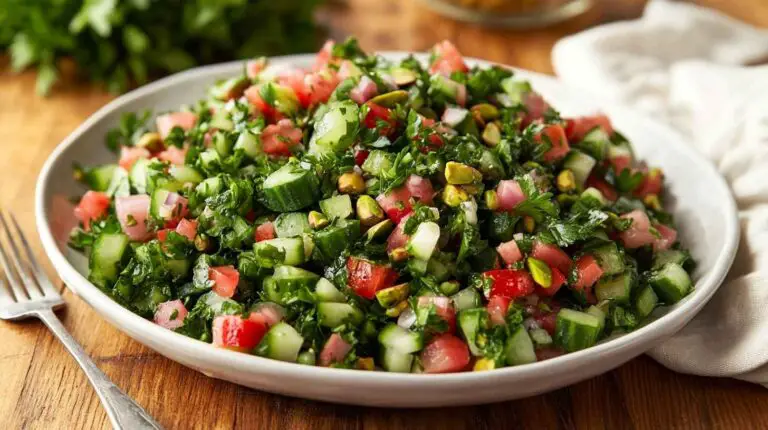Introduction: The Power of Anti-Inflammatory Smoothies — A Natural Solution for Gut Health
Have you ever experienced that uncomfortable bloating sensation after a meal? Or maybe you’re familiar with those unpredictable stomach cramps that disrupt your day? If so, you might be dealing with gut inflammation — a common issue affecting millions worldwide.
The good news? Anti-inflammatory smoothies can come to your rescue! These vibrant, nutrient-packed drinks offer a delicious way to soothe your digestive system, calm inflammation, and promote overall gut health.
Table of Contents
“A healthy gut is the foundation of overall well-being.” — Dr. Michael Gershon, author of The Second Brain.
In this article, we’ll dive deep into the causes of gut inflammation, the magic behind anti-inflammatory smoothies, and, of course, some irresistible smoothie recipes you can make at home. Let’s get blending!
Understanding Gut Inflammation: Causes and Symptoms

What Is Gut Inflammation?
Gut inflammation occurs when your digestive tract becomes irritated, often due to an immune response triggered by harmful substances like bacteria, toxins, or undigested food particles.
Imagine your gut as a busy highway; when inflammation strikes, traffic slows down, causing digestive discomfort, nutrient malabsorption, and even chronic diseases if left untreated.
Common Causes of Gut Inflammation
- Poor Diet: High intake of processed foods, sugars, and unhealthy fats.
- Stress: Chronic stress can disrupt gut-brain communication.
- Infections: Bacterial, viral, or fungal infections can inflame the gut.
- Medications: Long-term use of antibiotics, NSAIDs, and other medications.
- Leaky Gut Syndrome: A condition where the gut lining becomes permeable, allowing harmful substances to enter the bloodstream.
Symptoms You Shouldn’t Ignore ⚠️
- Persistent bloating
- Abdominal pain
- Diarrhea or constipation
- Unexplained fatigue
- Food intolerances
Pro Tip: “If you regularly experience digestive discomfort, keeping a food diary can help identify potential triggers.” 📜📊
The Link Between Inflammation and Gut Health
How Chronic Inflammation Affects Digestion
Chronic inflammation can wreak havoc on your digestive system. When inflamed, the gut lining becomes damaged, compromising its ability to absorb nutrients properly.
Think of your gut lining as a fine sieve; when it’s damaged, larger, unwanted particles pass through, causing further immune responses and discomfort.
The Gut-Brain Connection: A Two-Way Street
The gut and brain communicate via the gut-brain axis. When inflammation disrupts this communication, it can lead to anxiety, depression, and other mental health issues.
“Your gut acts like a second brain, influencing everything from mood to metabolism.” — Dr. Emeran Mayer, The Mind-Gut Connection.
Why Anti-Inflammatory Smoothies Are Good for Gut Health
Anti-inflammatory smoothies are more than just tasty drinks; they’re a powerhouse of gut-friendly nutrients.
How Do They Work?
- Reduce Inflammation: Ingredients like turmeric and ginger contain natural anti-inflammatory compounds.
- Promote Healthy Bacteria: Probiotic-rich foods like kefir and yogurt support a balanced gut microbiome.
- Improve Digestion: Fiber-rich ingredients help maintain regular bowel movements.
Table: Key Benefits of Anti-Inflammatory Smoothies
| Benefit | How It Helps Gut Health |
|---|---|
| Reduces Inflammation | Turmeric, ginger, and berries fight inflammation |
| Supports Good Bacteria | Probiotics from kefir and yogurt balance the microbiome |
| Aids Digestion | Fiber from fruits and seeds promotes regularity |
| Boosts Immune Function | Nutrient-dense ingredients strengthen immunity |
| Enhances Nutrient Absorption | Smooth texture aids better nutrient assimilation |
Did You Know? “Turmeric’s active compound, curcumin, has been shown to reduce inflammation comparable to some medications.” 🧂👩🔬
Top Ingredients for an Anti-Inflammatory Gut-Healing Smoothie
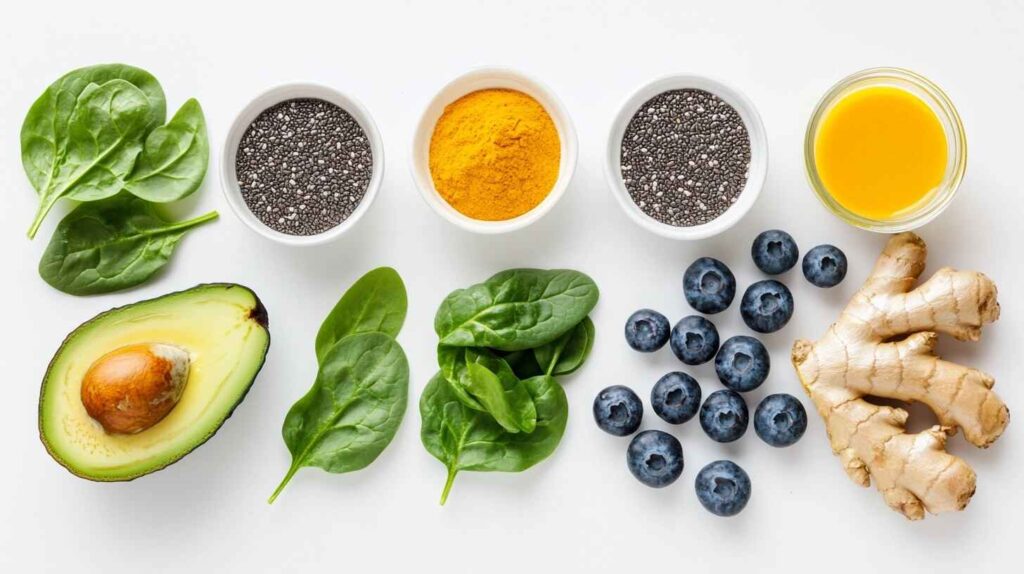
1. Superfoods That Combat Inflammation
- Turmeric: Packed with curcumin, a potent anti-inflammatory.
- Ginger: Aids digestion and reduces bloating.
- Berries (blueberries, raspberries, strawberries): High in antioxidants.
2. Probiotic and Prebiotic Powerhouses
- Kefir & Greek Yogurt: Introduce beneficial bacteria to your gut.
- Bananas: Contain resistant starch, which feeds good bacteria.
3. Healthy Fats for Gut Healing
- Avocado: Provides fiber and anti-inflammatory monounsaturated fats.
- Chia Seeds & Flaxseeds: Loaded with omega-3s.
Step-by-Step Guide to Making the Perfect Anti-Inflammatory Smoothie
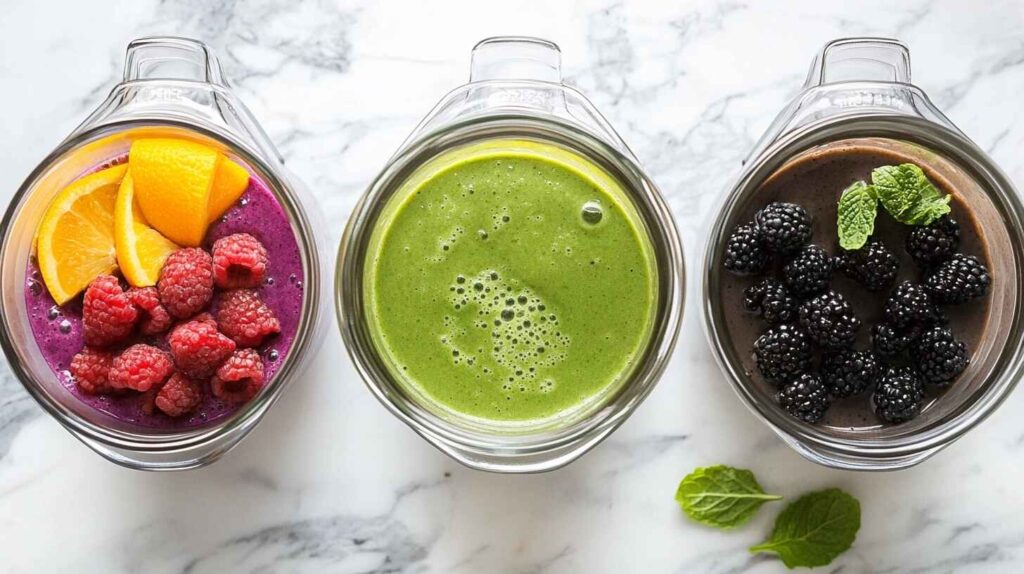
- Gather Your Tools: A high-speed blender, measuring cups, and spoons.
- Choose Your Base: Water, coconut water, or plant-based milk.
- Add Your Greens: Spinach, kale, or avocado.
- Throw in Your Fruits: Berries or bananas.
- Boost with Superfoods: Turmeric, ginger, and seeds.
- Blend: Start slow, then increase speed until smooth.
- Taste and Adjust: Add honey or cinnamon if needed.
Pro Tip: “Add ice cubes for a refreshing touch or use frozen fruits to skip the ice altogether.” 🍨💧
Recipe #1: Turmeric-Ginger Gut Soother
This golden smoothie not only tastes amazing but also helps reduce gut inflammation.
Ingredients:
- 1 cup unsweetened almond milk
- 1 banana (fresh or frozen)
- 1 tsp turmeric powder
- 1/2 tsp ground ginger
- 1 tbsp chia seeds
- 1 tbsp honey (optional)
- A pinch of black pepper (enhances curcumin absorption)
Directions:
- Blend all ingredients until smooth.
- Pour into a glass and enjoy immediately.
Nutritional Facts (Per Serving):
| Nutrient | Amount |
|---|---|
| Calories | 250 |
| Protein | 5g |
| Fiber | 6g |
| Sugars | 14g |
| Healthy Fats | 7g |
“This smoothie is like sunshine in a glass — delicious and healing!” ☀️🍼
Common Problems with Gut Health and How Smoothies Can Help
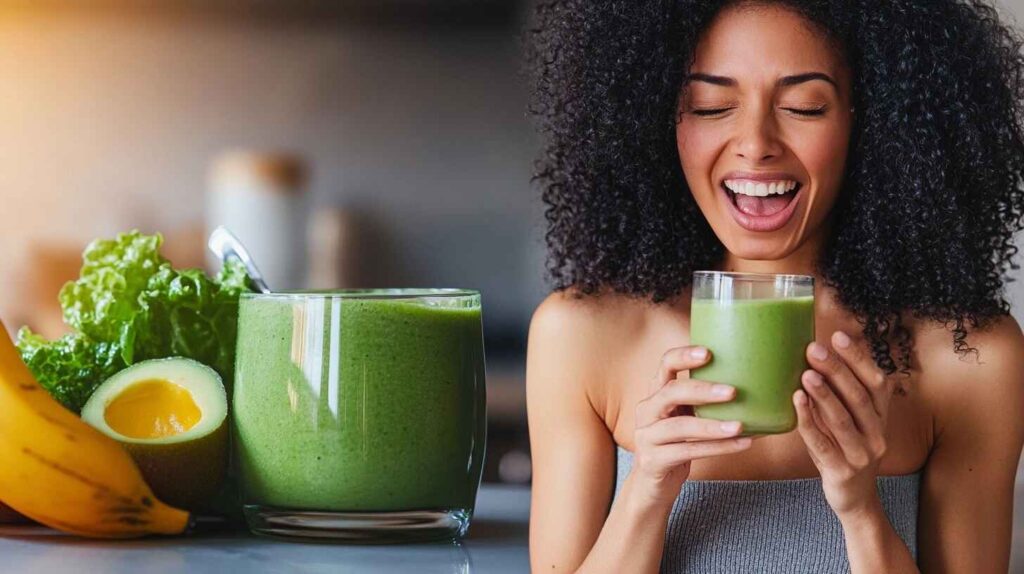
1. Bloating and Gas
Bloating is often caused by excessive gas production or disturbances in digestive tract movement.
How Smoothies Help:
- Incorporating ginger and peppermint can reduce gas.
- Probiotics from kefir can restore bacterial balance.
2. Acid Reflux and GERD
Acid reflux occurs when stomach acid flows back into the esophagus, causing heartburn.
How Smoothies Help:
- Low-acid fruits like bananas and melons can neutralize stomach acid.
- Almond milk can provide a soothing effect.
3. Leaky Gut Syndrome
Leaky gut syndrome is when the gut lining becomes more permeable, allowing toxins to leak into the bloodstream.
How Smoothies Help:
- Collagen-rich ingredients like bone broth and chia seeds support gut lining repair.
- Anti-inflammatory foods like turmeric can reduce gut lining irritation.
“Your gut is like a garden; nourish it well and watch your health flourish!” 🌿🍼
Practical Tips for Incorporating Smoothies into Your Daily Routine
1. Make It a Morning Habit
Kickstart your metabolism by enjoying an anti-inflammatory smoothie with breakfast.
2. Prep Ahead of Time
Pre-chop fruits and portion ingredients into freezer-safe bags for convenience.
3. Experiment with Flavors
Don’t be afraid to mix different ingredients. For example, mango and ginger create a tropical twist.
FAQs
What are the best ingredients for an anti-inflammatory smoothie?
The best ingredients include turmeric, ginger, berries, chia seeds, avocado, and kefir. These foods are packed with nutrients and anti-inflammatory properties that support digestive health.
How many anti-inflammatory smoothies can I drink per day?
It’s generally recommended to have one anti-inflammatory smoothie per day. However, listen to your body and vary your ingredients to get a wide range of nutrients.
Can anti-inflammatory smoothies help with bloating?
Yes! Smoothies with ingredients like ginger, kefir, and chia seeds can help reduce bloating by promoting healthy digestion and balancing gut bacteria.
Can I prepare my anti-inflammatory smoothies in advance?
Absolutely! You can prep your ingredients and freeze them in portions. You can also prepare a smoothie and store it in the refrigerator for up to 24 hours.
Final Thoughts: Sip Your Way to Gut Health
Incorporating anti-inflammatory smoothies into your diet can significantly improve gut health, reduce inflammation, and boost overall well-being. With just a blender, some fresh ingredients, and a bit of creativity, you can enjoy delicious, health-enhancing drinks every day.
“Good health starts from the gut — and a smoothie a day might just keep the bloating away!” 🍹💚
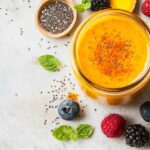
Anti-Inflammatory Smoothie for Gut Health The Ultimate Guide to Healing Inflammation Naturally
- Total Time: 5 minutes
- Yield: 1 serving 1x
- Diet: Gluten Free
Description
This anti-inflammatory smoothie is the perfect blend of delicious and nutritious! Packed with gut-friendly ingredients like turmeric, ginger, and chia seeds, it helps reduce inflammation, improve digestion, and promote overall gut health. Perfect for a quick breakfast or a post-workout snack! 🍌🥝🍊
Ingredients
- 1 cup unsweetened almond milk 🥛
- 1 ripe banana (fresh or frozen) 🍌
- 1 tsp turmeric powder 🌿
- 1/2 tsp ground ginger 🫚
- 1 tbsp chia seeds ⚫
- 1 tbsp ground flaxseeds 🥥
- 1 tbsp honey (optional) 🍯
- A pinch of black pepper (to enhance curcumin absorption) 🧂
- A handful of spinach (optional for extra fiber) 🥬
- Ice cubes (optional for a chilled drink) 🧊
Instructions
- Prepare the Ingredients: Gather all the ingredients and measure the quantities.
- Blend: In a high-speed blender, combine almond milk, banana, turmeric, ginger, chia seeds, flaxseeds, honey, and black pepper.
- Blend Until Smooth: Blend on high speed for 30–60 seconds until the mixture is creamy and smooth.
- Adjust Consistency: If the smoothie is too thick, add a little more almond milk and blend again.
- Serve: Pour into a glass and garnish with chia seeds or a sprinkle of turmeric.
- Enjoy: Drink immediately for the best taste and nutritional benefits.
Notes
- Turmeric Tip: Add black pepper to maximize curcumin absorption.
- Sweetness: Adjust honey based on your preference.
- Gut Boost: Add a tablespoon of kefir or Greek yogurt for extra probiotics.
- Vegan-Friendly: Use maple syrup instead of honey.
- Prep Time: 5 minutes
- Cook Time: 0 minutes (blending only)
- Category: Beverage
- Method: Blended
- Cuisine: Global / Health-conscious
Nutrition
- Serving Size: 1 glass (approximately 350ml)
- Calories: 250 kcal
- Sugar: 16g
- Sodium: 150mg
- Fat: 7g
- Saturated Fat: 1g
- Unsaturated Fat: 5g
- Trans Fat: 0g
- Carbohydrates: 40g
- Fiber: 7g
- Protein: 6g
- Cholesterol: 0mg




